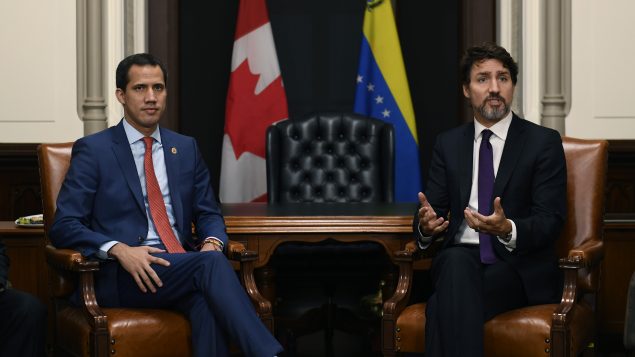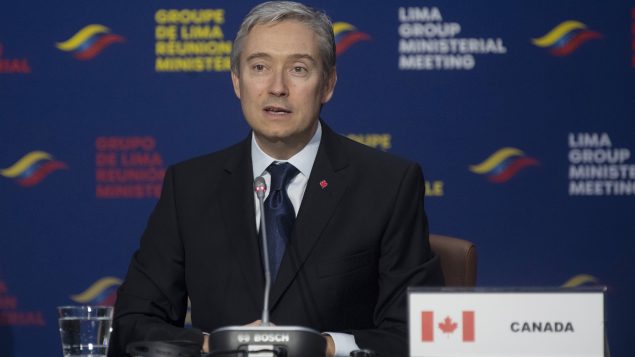Canada is hosting foreign ministers from more than a dozen Latin American and Caribbean countries opposed to Venezuela’s Socialist President Nicolas Maduro amid growing signs that the Western-backed push by the splintered Venezuelan opposition to remove the controversial leader is sputtering.
The meeting of the Lima Group in Gatineau, Quebec, near Ottawa, comes amid a renewed push for a new presidential election in Venezuela and attempts to drum up international support for the flagging opposition movement.
“The world is watching each and every one of us to bring this new momentum in the quest for the Venezuelan people to democracy,” Foreign Affairs Minister Francois-Philippe Champagne said Thursday as he opened the Lima Group meeting.
“We gather today to discuss the challenges the Venezuelan crisis represents for all of us and how we, the Lima Group, can bring the world community together to re-establish democracy in that country.”
Canada and nearly 60 countries recognize opposition legislator Juan Guaido as Venezuela’s legitimate leader, and view Maduro as an illegitimate president who stole his country’s last election in 2018.
- Leader of Venezuela’s opposition gets backing in Canada
- Venezuela closing consulates in Canada amid diplomatic tensions
Guaido, who proclaimed himself interim leader of Venezuela just over a year ago in an unsuccessful attempt to oust Maduro following the controversial election, is not expected to be at the meeting at the Canadian Museum of History across the Ottawa River from Parliament Hill.

Canada’s Prime Minister Justin Trudeau and Venezuelan opposition leader Juan Guaido meet at Trudeau’s Parliament Hill office in Ottawa, on Monday, Jan. 27, 2020. (Justin Tang/THE CANADIAN PRESS)
Canada and other members of the Lima Group of nations – which includes Bolivia, Brazil, Chile, Colombia, Costa Rica, Guatemala, Honduras, Panama, Paraguay, Peru – have been calling on Maduro, who won a highly controversial vote in May 2018, to step down and clear the way for new elections.
“We are looking for a joint vision for the participation of the international community,” Peru’s Foreign Minister Gustavo Meza-Cuadra said through a Spanish interpreter. “The only way to return democracy to Venezuela and overcome the crisis is to ensure that there are presidential and parliamentary elections that are free, fair and transparent and inclusive.”
Foreign ministers from the Dominican Republic, Ecuador, and El Salvador have also joined the meeting in Gatineau, the third Lima Group meeting hosted by Canada, which was one of the co-founders of the coalition in August 2017.
However, Mexico, Canada’s largest Latin American trading partner, is not part of the group. The government of Mexican President Andres Manuel Lopez Obrador has not recognised Guaido’s claim on Venezuela’s presidency, and has instead argued for negotiations to end the country’s crisis.
According to UN High Commissioner for Human Rights Michelle Bachelet, 4.7 million Venezuelans have fled the country since the crisis began in 2016, and by the end of 2020, that number is expected to reach 6.5 million.
Once one of the most prosperous Latin American countries, Venezuela suffers from staggering hyperinflation, shortages of basic goods and general economic collapse.

Opposition supporters react in front of military vehicles during a rally against the government of Venezuela’s President Nicolas Maduro and to commemorate May Day in Caracas Venezuela, May 1, 2019. (Carlos Garcia Rawlins/REUTERS)
Critics of the government accuse Maduro of running the economy into ground with failed policies, cronyism, corruption and mismanagement. The government blames sabotage and a concerted U.S.-led international campaign to undermine Venezuela’s economy for the country’s economic woes.
Maduro accuses the opposition of acting as puppets of U.S. and foreign interests whose only goal is to overthrow his Socialist government.
A report by the Office of the UN High Commissioner for Human Rights released in July of 2019, accuses the Maduro government of implementing a strategy “aimed at neutralizing, repressing and criminalizing political opponents and people critical of the Government.”
It also accuses the government and its special police forces of more than 5,287 extrajudicial killings, purportedly for “resistance to authority.”
The government counters that its law enforcement forces have had to respond to violent anti-government protests.
With files from The Canadian Press







For reasons beyond our control, and for an undetermined period of time, our comment section is now closed. However, our social networks remain open to your contributions.